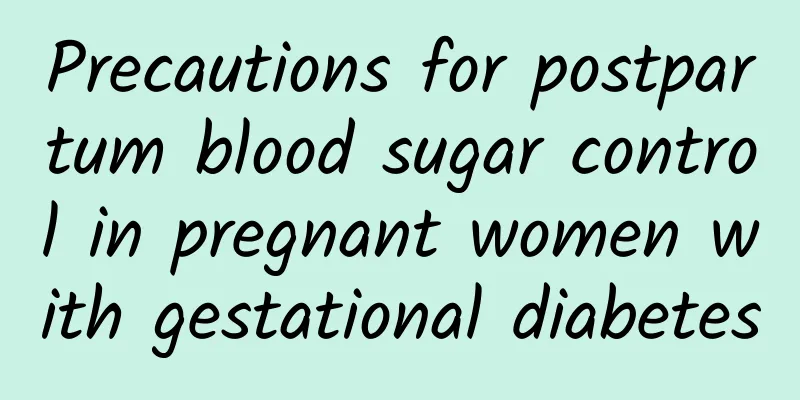Precautions for postpartum blood sugar control in pregnant women with gestational diabetes

|
For most women, pregnancy is an important stage in their lives, and it has important and special significance for women. During pregnancy, due to the influence of fetal growth and development, some women are prone to pregnancy-related diseases, among which gestational diabetes has a certain impact on the health of the mother. However, due to the lack of knowledge about the relevant knowledge, some mothers often find it difficult to effectively achieve scientific control of postpartum blood sugar. This article introduces and sorts out the relevant issues, hoping to effectively achieve scientific protection for maternal health. 1. Gestational diabetes and its hazards Relevant data show that gestational diabetes is a type of diabetes that is triggered by abnormal glucose metabolism that occurs for the first time after pregnancy. It is one of the more common complications for women during pregnancy. During pregnancy, pregnant women may experience a series of problems such as relatively insufficient insulin secretion, increased insulin resistance, and increased glucose demand, which in turn increases the risk of the disease. From a health perspective, the disease can lead to an increase in the incidence of problems such as abnormal amniotic fluid, asphyxia, miscarriage, and premature birth, which in turn has a great impact on the physical and mental health of mothers and babies. 2. Precautions for postpartum blood sugar control in pregnant women with gestational diabetes 1. Closely monitor the blood sugar level of the mother In order to help pregnant women with gestational diabetes achieve reasonable health protection during the postpartum rehabilitation stage, nurses should guide pregnant women to regularly monitor and record their blood sugar indicators so that they can have a clear understanding of their blood sugar status. This can help pregnant women to scientifically regulate their living habits according to their blood sugar levels in a timely manner, which is conducive to promoting the gradual achievement of maternal blood sugar control goals. 2. Scientifically control the daily diet of pregnant women From the perspective of diet, in order to help pregnant women with gestational diabetes control their blood sugar levels after delivery, nurses should help pregnant women actively regulate their postpartum diet. Specifically, the sugar intake in the postpartum diet of pregnant women should be strictly controlled to ensure that the pregnant women follow the principle of light diet. On this basis, pregnant women should be actively guided to make scientific combinations of different ingredients to ensure a reasonable ratio of ingredients such as meat, eggs, dairy products, seafood, vegetables and fruits, so as to effectively promote the management of maternal health after delivery. During this period, a diet plan should be actively formulated according to the individual situation of the pregnant women to avoid excessive supplementation after delivery, which can reasonably achieve stable control of blood sugar levels. 3. Actively carry out postpartum rehabilitation exercises During the postpartum rehabilitation process, nurses should help mothers develop scientific rehabilitation exercise plans and guide them to develop good exercise habits. This can help mothers achieve full metabolism of sugar through exercise and promote the improvement of postpartum blood sugar index control. In terms of specific practices, it is recommended that mothers do appropriate physical exercise 40 to 60 minutes after three meals. This helps mothers digest food and promote the rational metabolism of sugar, which is very helpful for reducing maternal blood sugar indicators. On the other hand, this method can also be combined with exercise to strengthen the physical fitness of mothers, which is also of positive significance for the protection of maternal postpartum health. 4. Conduct regular postpartum health assessments In the postpartum recovery process, in order to further understand the health status of pregnant women with gestational diabetes, nurses should promptly evaluate and systematically analyze relevant issues, which is of great auxiliary significance for the protection of maternal health. Generally, a comprehensive health assessment should be conducted on the pregnant women 42 days after delivery, which can fully understand the overall postpartum recovery of the pregnant women. Based on this, nurses can provide personalized health guidance according to the postpartum recovery situation, which is of great significance for the maintenance of maternal health. 5. Carry out health knowledge education activities Lack of sufficient knowledge about gestational diabetes is often the key factor that makes it difficult for mothers to reasonably control their blood sugar levels in the postpartum period. Therefore, nurses should carry out systematic education and popular science on gestational diabetes knowledge based on some clinical manifestations and symptoms of mothers during nursing. During the specific work, nurses can introduce and explain relevant knowledge through various forms such as playing popular science videos, distributing health knowledge manuals, and organizing special lectures for mothers with gestational diabetes. This can strengthen the mother's level of knowledge and has a good promoting effect on the protection of maternal health. In general, gestational diabetes is a common problem that harms the majority of women of childbearing age. The disease has a great impact on the health of mothers and infants, and also has a profound impact on the physical and mental health of mothers after childbirth. In order to reasonably deal with related issues, nurses should actively analyze and study the methods and approaches of nursing work in combination with nursing practice, so as to promote the diversified development of nursing work. I believe that with the unremitting efforts and active exploration of nurses, the postpartum health of pregnant women with gestational diabetes in my country will definitely be significantly improved. (Tan Li, Delivery Room, Shijiazhuang Maternal and Child Health Hospital) |
<<: A brief discussion on matters needing attention during calcium supplementation
>>: Emergency nursing care for patients with myocardial infarction
Recommend
Causes of pain under the left rib cage in women
Costal neuralgia has now become a very common dis...
Can I swim with a tampon inserted?
During menstruation, it is generally not recommen...
How does Traditional Chinese Medicine treat varicocele?
Author: Zhou Xing, The First Affiliated Hospital ...
What is the best fruit to eat during menstruation?
During menstruation, women's physical conditi...
Dizziness after drinking glucose
Grape sugar screening is a test that women do dur...
Beware! The "silent killer" - liver cirrhosis
March 18th of every year is "National Liver ...
What to do if your blood pressure is low during pregnancy
Some pregnant women are prone to low blood pressu...
It is normal for girls to have their periods delayed for a few days.
Many female friends have irregular menstruation f...
Four tips for fuller breasts
A full and healthy chest gives women a unique smo...
Cervical bleeding during gynecological examination
Regular physical examinations are a way for both ...
Can an 18-year-old girl still grow taller?
At the age of 18, girls' height is basically ...
Check six hormones on the second day of menstruation
The values of the six sex hormones tested durin...
Hot hands and feet Irregular menstruation
Hot hands and feet and irregular menstruation may...
Bleeding after taking birth control pills for a few days
In life, some female friends will experience blee...
Urethra discomfort after urinating
Women experience urethral discomfort after urinat...









